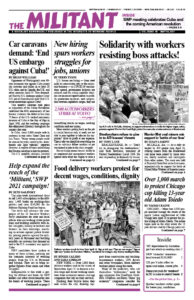U.S. bosses are hiring — from steel mills to construction sites to the restaurant business — as COVID-19 vaccinations spread, government lockouts are reduced and the ruling capitalist families see increased opportunities to profit. As production increases, and competition between capitalists surges, they are intensifying attacks on wages, working conditions and our unions.
More workers getting back on the job is crucial because only at work are we able to join together to take on the employers’ drive to profit at our expense. That is why we should do everything we can to convince fellow workers to get vaccinated to join in the class struggle.
Recent hiring means bosses’ ability to pit employed and unemployed workers against each other has begun to ease a little. Bosses use these divisions to try to dampen down working peoples’ struggles against attacks on wages and conditions. Though still calamitous for countless workers, official unemployment fell from 19.7 million in early March to 17.4 million April 3, down from 23.1 million at the height of the crisis a year ago.
In March manufacturing production was growing and restaurants, bars, hotels, local shops and many other stores were reopening.
Many employers are acting on the expectation that new hires and workers they’re calling back after months of unemployment or temp jobs will be easier to push around. They’re moving to lower wages, speed up work pace and cut benefits. But some bosses are finding their assumptions are wrong.
Workers fight back
ATI steel bosses gave 1,300 striking steelworkers an ultimatum to accept onerous contract demands within four days or face an even worse contract offer April 26. United Steelworkers members categorically rejected the threats. Strikers’ picket lines remain up and the fight continues.
Many of these fights involve workers striving to redress concessions granted in earlier contracts. In Jefferson City and Columbia, Missouri, truck drivers at Scheppers Distributing Co., a beverage delivery company, struck April 19 for higher wages. Workers had earlier taken a pay “freeze for four years to live to fight another day,” Teamsters Local 833 representative Mark Bruemmer told KRCG-TV News. Now, “that day has come.”
Some 2,900 United Auto Workers struck Volvo Trucks New River Valley plant in Dublin, Virginia, April 17. Bosses there seek to boost profits as they upgrade the plant to start building electric-powered rigs.
“Each of these strikes, as well as fights by coal miners at Warrior Met in Alabama and Marathon oil refinery workers in Minnesota, can win widespread support from fellow working people, if workers everywhere and our unions spread the word and build support,” Rebecca Williamson, Socialist Workers Party candidate for Seattle City Council, told the Militant. Williamson brought solidarity to the Marathon workers in Minnesota and joined them on their picket line.
“To strengthen our struggles, workers and our unions need to fight to reverse the widespread unemployment we still face,” she pointed out. “That’s why the SWP campaigns for workers and our unions to fight to cut the workweek — with no cut in pay — to make the bosses pay to keep our fellow workers on the job. We demand a government-funded public works program to provide jobs, run under workers control, at union pay for all who want them.”
Especially hard hit are women workers. Some 6.3 million people, mainly women, are out of work caring for children because there is no affordable child care, or schools are still shut down.
In total, the government reports there are 17,405,094 people on one or another kind of unemployment dole today. Millions more aren’t counted. And these figures don’t take into account at least 6.8 million workers who have had their hours cut, along with their wages.
As workers look for ways to survive these conditions, many have been forced into debt. Largely unreported is the way the government’s moratorium on evictions is riddled with loopholes, enabling judges to back landlords who throw tenants onto the streets. In just seven states some 70,000 people have been evicted in the past year. Millions more face debts for loans they took out in order to keep a roof over their heads.
Despite its name, President Joseph Biden’s “American Jobs Plan” doesn’t create a single job. It funnels government investment to company owners producing energy sources and transportation that don’t use fossil fuels. The administration promises that these bosses will then hire workers sometime in the future.
Liberals continue to paint a picture of a world where jobs in mines, mills and factories are disappearing and the only future for workers is in the “gig” economy. New York Times columnist Paul Krugman praised the United Mine Workers union for backing Biden’s plan April 22, but warned “promoting job creation in West Virginia or eastern Kentucky … may be impossible.” His message is let the communities these workers live in die out. Future hiring will be concentrated among the “highly educated” in big cities, Krugman claims.
But in New York City food delivery workers, including many recently hired, are marching in the streets against wage-theft and conditions imposed on them by bosses who look at them with disdain.
“The fight for jobs remains central to binding employed and unemployed workers together and putting us all in a better position to resist the bosses,” Williamson said. “As hiring grows, more struggles are breaking out. Through these fights we gain class consciousness and learn what we are really capable of.”

